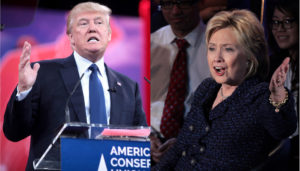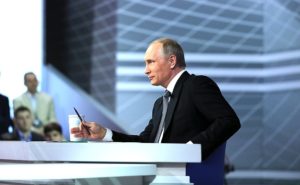
Gilbert Doctorow, Ph.D.
Gilbert Doctorow is the European Coordinator of The American Committee for East West Accord Ltd and a Senior Research Fellow of the American University in Moscow. His most recent book Does Russia Have a Future? was published in August 2015.
Russian media is much more nuanced than the U.S. public is led to believe, even showing a perceptive approach to describing the Trump-Clinton presidential debate, as Gilbert Doctorow observed first-hand.
On Sept. 25, I received a phone call at my Brussels home inviting me to Moscow to participate in a political talk show on a state-run station to analyze the first Trump-Clinton debate, which was clearly the flavor of the day for Russian television programming.
I was not surprised when shortly thereafter I got an email invitation to participate in another talk show on a competing state channel also devoted to this subject. As a Russian-speaking "talking head” carrying a U.S. passport and willing to go to Moscow, I am part of a thin group. Out of consideration of professional ethics, I declined this second invitation but took a rain check to join them on Nov. 9 for a U.S. election postmortem.

Republican presidential nominee Donald Trump and Democratic nominee Hillary Clinton. (Photos by Gage Skidmore and derivative by Krassotkin, Wikipedia)
The political talk show that was the first to invite me, called "Sixty Minutes,” is entirely new, launched at the start of the fall television season and runs daily Monday through Friday. Its name self-consciously recalls a similarly named long-running American television news program, though the format here is not pure news but more talk show.
Yet, the program borrows much from its American namesake. It’s slick, show-biz in visual impact with well-researched scripts that the presenters, a husband and wife team of widely known young and bold journalists, Yevgeny Popov and Olga Skabeyeva, deliver with panache.
The show on Tuesday evening – a day after the debate between Hillary Clinton and Donald Trump – was not ideal, but I was grateful to my hosts for being brought to Moscow for the event. The invitation forced me to get up in the middle of the night, European time, to watch the Clinton-Trump debate from beginning to end and to direct my full attention to it, which I would not otherwise have done.
It also forced me to read the Russian press fairly thoroughly on my way to Moscow in order to anticipate the angle of interest there. And most importantly, once I was on the panel, it gave me an insider’s look into how Russia’s elites view the contest between Trump and Clinton, not only from what was said during the show but also from our exchanges in the breaks and immediately after the broadcast in the relaxation room with snacks before we headed our various ways.
The premise of the show’s producers was that the debates would hold great interest for a good many Russians because their country has figured large in the U.S. campaigns of both parties.
The Clinton camp has repeatedly and publicly accused Russian President Vladimir Putin of interfering in the U.S. political process. Russian hackers were blamed for the very embarrassing publication of internal emails from the Democratic National Committee showing a bias against the candidacy of Bernie Sanders during the primaries. Moreover, Clinton and her assistants have portrayed Trump as a kind of modern-day "Manchurian candidate” who would betray American interests to Putin, his supposed friend.
For his part, Donald Trump publicly criticized the Establishment position of escalating conflict with Russia and China to which Hillary Clinton has long contributed. He has said that he saw nothing wrong in redirecting relations to cooperation and has praised the Russian military action against the Islamic State jihadists in Syria.
Trump also has made clear his accommodative stance on Russia’s reunification with Crimea. Plus, Trump challenged directly the relevance today of NATO with its focus on countering Russia’s recovery of its great power status, coming at the expense of distracting from the threat of Islamic terrorism. Trump broadly hinted at a possible reduced U.S. presence if not withdrawal altogether from the alliance for failing to carry its own weight in the common defense.
All of these aspects of the American campaign have been brought to the attention of the broad Russian public by its mass media over recent months.
Assessing the Russian Role
The proposed message of the talk show’s producers last Tuesday night was Russia as an important factor in the U.S. debates, which they measured by the number of times each of the candidates made reference to Russia. There is some merit to this argument, given that only a few separate countries were mentioned by either candidate during their 90 minutes: Russia, China and Iran in descending order of frequency.

Russian President Vladimir Putin answering questions from Russian citizens at his annual Q&A event on April 14, 2016. (Russian government photo)
However, the two contexts for mention of Russia – the alleged hacking of the DNC server and the renewal of a nuclear arms race – were both old news. The far more striking feature of the debates was the failure of either candidate to raise and discuss the alarming escalation in verbal confrontation between the two countries in and on the sidelines of the United Nations Security Council over the preceding two weeks.
During that time you had U.S. Ambassador to the U.N. Samantha Power callingRussian action in and around Aleppo "barbarism.” And you had Russian Minister of Foreign Affairs Sergei Lavrov stating in an interview that it seemed the Pentagon was no longer under the control of the White House. This type of rhetoric from both sides marks a 30-year low point in relations and could be described as what you hear just before countries engage in hostilities.
The escalating confrontation with Russia had two book-ends. It began one day into the cease-fire when a U.S.-led air attack on an isolated Syrian Army position at Deir Ezzor resulted in the death of more than 60 Syrian soldiers. At the other end, a week later, was the combined Syrian and Russian heavy bombing of East Aleppo, which Power denounced.
The show’s hosts must be congratulated for trying hard to convey the essence of American political culture to their audience, and they did some effective research to this end. Whereas French and other Western media devoted coverage on the day after the debates to the physical appearances of the candidates, Russia’s "Sixty Minutes” tweaked this aspect of the debates to find politically relevant commentary.
To make their point, presenter Yevgeny Popov came on stage in a blue suit and blue tie very similar in coloring to Trump’s, while co-presenter Olga Skabeyeva was wearing a garment in the same red hue as Hillary. They proceeded to note that these color choices of the candidates represented an inversion of the traditional colors of the Democratic and Republican parties in American political tradition.
And they took this a step further by declaring it to be in line with the inversion of policies in the electoral platforms of the candidates: Hillary Clinton has taken over the hawkish foreign policy positions of the Republicans and their neoconservative wing; and Donald Trump has taken over the dovish foreign policy positions normally associated with Democrats.
Moreover, Trump also has gone against the free-trade policies that were engrained in Republican ideology until now, while often rejected by Democrats with their traditional backers from labor unions. All of these observations are essentially correct and astute. It was curious to hear them coming from Russian journalists, when they are largely missed by West European and American commentators.
Of course, a talk show is only partly formed by its producers and presenters. The greater part of the program is the opinions put forward by the invited panelists.
As is typical of such shows, the panel changed slightly during the course of the three 20-minute segments, with some panelists replaced by others who were waiting on the benches for their turn. And of the seven or eight on stage at any one time, two or three were foreigners. I was one of two Americans, and the third foreigner was a Brit, the long-time Moscow correspondent of Newsweekmagazine.
Russians Debating Russians
Sometimes foreigners are important to the Russian talk shows to add pepper and salt. In this case, we were largely decorative. The lion’s share of the program was shared between the Russian politicians and journalists on the panel who very ably demonstrated that Russian elites are split down the middle on whether Donald Trump or Hillary Clinton is their preferred next occupant of the Oval Office.
The reasons given are not what you hear within the U.S.: that Trump is vulgar, that Trump is a bigot and misogynist. Instead the Russian Trump-skeptics were saying that he is impulsive and cannot be trusted to act with prudence if there is some mishap, some accidental event occurring between U.S. and Russian forces in the field, for example.
They also expressed the cynical view that Trump’s positions in the pre-election period are purely tactical, to differentiate himself from all competitors first in his own party during the primaries and now from Clinton. In that view, Trump could turn out to be no friend of Russia if elected.
A direct answer to these changes came from the pro-Trump members of the panel, best enunciated by the senior politician in the room, Vyacheslav Nikonov, a Duma member from Putin’s United Russia party, the chair of the Education Committee in the Sixth Duma. He is also chair of a government-sponsored organization of Russian civil society, Russian World, which looks after the interests of Russians and Russian culture in the diaspora abroad.
Nikonov pointed to Trump’s courage and determination which scarcely suggest merely tactical considerations driving his campaign. According to Nikonov, Trump has gone up against the entire U.S. political establishment, against the whole of corporate mainstream media and has been winning. Nikonov pointed to the surge in Trump poll statistics in the couple of weeks preceding the debate. And he ticked off the four swing states which Trump needs to win and where his fortunes had been rising fast. Clearly, this presentation was carefully prepared, not something casual and off-the-cuff.
During this exchange between doubters and backers of Trump, one doubter spoke of Trump as a "non-systemic” politician, which may be loosely interpreted as meaning he is anti-establishment. But in the Russian context it has an odious connotation, for instance, applied to Alexei Navalny and certain members of the American- and European Union-backed Parnas political movement, including its head Mikhail Kasyanov. The word suggests seditious intent.
In this connection, Nikonov put an entirely different spin on who Trump is and what he represents as an anti-establishment figure. But maybe such partiality runs in the family. Nikonov is the grandson of Molotov, one of the leading figures who staged the Russian Revolution and governed the young Soviet state.
Who won the first Trump-Clinton debate? Here the producers of "Sixty Minutes” gave the final verdict to a Vesti news analyst from a remote location whose image was projected on a wall-sized screen. We were told that the debate was a draw: Trump had to demonstrate that he is presidential, which he did. Clinton had to demonstrate she had the stamina to resist the onslaught of a 90-minute showdown with Trump and she also succeeded.
In summation, the talk show analysis of the first U.S. presidential debate that I saw up close in Moscow may have been more glitzy and had less gravitas than Charlie Rose’s postmortem session at Bloomberg TV, but it was, in its own way, a value to its audience, which probably numbered in the tens of millions.




_jpg/250px-ElbeDay1945_(NARA_ww2-121).jpg)





